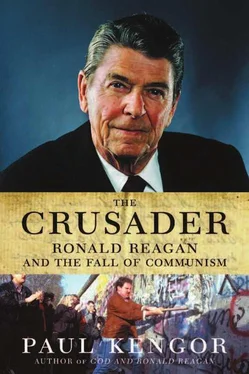72. His conversion is based on the “then-realistic black market exchange rate” of six rubles for one dollar.
73. Based on six credible sources, both American and Soviet, this was the number cited by Princeton’s Woodrow Wilson School at its February 1993 Cold War conference. “Retrospective on the End of the Cold War,” Woodrow Wilson School, Princeton University, February
25–27, 1993, 7.
74. The height of Reagan defense spending as a percentage of GDP was 6.2% in 1986. In 1981 it was 5.1%; by 1988 it was 5.8%.
75. This was a 1980 figure. Trofimenko’s conversion is based on the “then-realistic black market exchange rate” of six rubles for one dollar. Another source says that by 1992, when Russia was no longer Communist and thus more honest in its numbers, GDP was 15 trillion rubles. Reed, At the Abyss, 224.
76. Odom, The Collapse of the Soviet Military, 366.
77. The peak period for military spending (defense outlays) in the 1980s was $256.6 billion in 1989, up from $164.0 billion in 1980, measured in constant FY 1982 dollars. This $256.6 billion was 26.5% of total outlays for the year, or 5.9% of GDP for that year. The highest percent of GDP for any year in the 1980s was 6.5% in 1986. Historical Tables, Budget of the United States Government, Fiscal Year 1992, Pt. 7 (Washington, DC: Government Printing Office, 1991), 66–70.
78. Genrikh Aleksandrovich (Henry) Trofimenko in Hofstra conference (1993) proceedings, 139.
79. Trofimenko in Hofstra conference (1993) proceedings, 139.
80. An excellent case in point is the two Koreas—the Communist North and nonCommunist South. To cite a typical year, in 1995 North Korea’s military spending was roughly
23% of GDP, compared to a mere 3% for South Korea. Yet, because South Korea is vastly more prosperous than the North, despite the fact that the North holds the vast majority of the peninsula’s land and resources, North Korea’s total military spending was almost three times lower than South Korea’s ($5 billion vs. $14 billion).
81. There were other contributory factors to the deficit, some Reagan’s doing and some not. 82. Weinberger said that Reagan told him this “frequently,” a point that Weinberger himself has made frequently. Among other examples, see Weinberger, In the Arena, 275. 83. Gorbachev’s remarks as recorded by Morris, Dutch, 561.
84. Alexander Bessmyrtnykh interviewed on “Reagan,” The American Experience, PBS. This book could be filled with such testimonies, from the Russian in the street, to military officials, to apparatchiks, to the Soviet ministry, to Gorbachev. I cut twenty pages of testimonies from this chapter.
85. Princeton University, Woodrow Wilson School of Public and International Affairs, “Retrospective on the End of the Cold War,” A Conference Sponsored by the John Foster Dulles Program for the Study of Leadership in International Affairs, Princeton, NJ, February
25–27, 1993; and Bruce Olson, “SDI, Chernobyl Said to Break Cycle of Nuclear Buildup,” Executive News Service, February 26, 1993. His remarks are also published in Wohlforth, ed., Witnesses to the End of the Cold War, 31–32.
86. The Soviet press articles cited throughout this chapter offer examples of both perspectives. 87. Still, as Soviet officials and Gorbachev aides and confidantes attest—such as Anatoly Chernyaev and Nikolai Detinov—Gorbachev was at the very least fearful of a workable limited antimissile system. One of the better presentations of this Soviet thinking, provided by highlevel Soviet officials themselves, is a May 8, 1998 discussion held at a Brown University symposium, “Understanding the End of the Cold War,” a transcript of which is provided by Brown University.
88. Gorbachev, Memoirs, 407.
89. Chernenko reportedly said of SDI: “The goal is…to deprive [the USSR] of the possibility of a reciprocal strike in case of nuclear aggression against it.” Atanas Atanasov, “In Moscow, in March,” Rabotnichesko Delo (Sofia, Bulgaria), March 8, 1985, 6, published as “Marshal Tolubko Interviewed on Geneva, SDI,” in FBIS, FBIS-12-MAR-85, March 12, 1985, AA4.
On the Soviet TV program, “Top Priority,” Sergey Plekhanov of the Institute for USA and Canada Studies said that a “shield” or “astrodome which would protect the United States from Soviet missile[s] is a pie in the sky, there’s no possibility of building that.” He maintained that the real purpose of SDI was to ensure the United States a “first-strike capability.” “‘Top Priority’ Program Addresses U.S. Policies,” transcript published in FBIS, FBIS-30-JAN-87, January 30, 1987, A2.
90. These Gorbachev remarks were made at the 2:30–3:40 pm session on November 19. “Geneva Meeting: Memcons of Plenary Sessions and Tete-A-Tete,” November 19–21, 1985, declassified May 2000, RRL, Box 92137, Folder 2. Gorbachev told Reagan in a December 1985 letter that, “Viewing the SDI program from such a position the Soviet leadership inevitably arrives at one conclusion: in the current actual conditions, the ‘space shield’ is needed only by the side which is preparing for a first (preemptive) strike.” See Reagan, An American Life, 646.
91. Grinevsky speaking on May 8, 1998 at Brown University symposium, “Understanding the End of the Cold War.”
92. Slipchenko continued: “Marshal Sergeev eventually shut it [the program] down as ineffective. Why did the money get invested there? The investment began early, of course, and once it got started, it continued.” Slipchenko speaking on May 8, 1998 at Brown University symposium, “Understanding the End of the Cold War.”
93. Tim Weiner, “Lies and Rigged ‘Star Wars’ Test Fooled the Kremlin, and Congress,” New York Times, August 18, 1993, A1.
94. Quoted in Morris, Dutch, 544. In an April 28, 1987 interview Reagan said it was “very obvious” that Gorbachev “is faced with a tremendous economic problem, and a great deal of that problem has been aggravated, made worse, by their military buildup.” Reagan, “Interview with White House Newspaper Correspondents,” April 28, 1987.
95. A tense Gorbachev reported to his Central Committee that the White House “clearly wants to pull us into a second scenario of the arms race. They are counting on our military exhaustion. And they are trying to pull us in on the SDI.” Also at this session, a pained Gorbachev lamented that his government was “stealing everything from the people” in trying to keep up with the Reagan spending. The Soviet attempt to match the United States was “turning the country into a military camp.” These notes from the May 8, 1987 Communist Party of the Soviet Union Central Committee Session are found in Anatoly Chernyaev’s diary, held at the Gorbachev Foundation. Credit goes to Peter Schweizer for finding these notes. Schweizer, Reagan’s War, 258.
96. Gorbachev said this at the third plenary meeting, held from 11:30 am to 12:40 pm. “Geneva Meeting: Memcons of Plenary Sessions and Tete-A-Tete,” November 19–21, 1985, declassified May 2000, RRL, Box 92137, Folder 2.
97. Likewise, Gorbachev said this at the third plenary meeting. “Geneva Meeting: Memcons of Plenary Sessions and Tete-A-Tete,” November 19–21, 1985, declassified May 2000, RRL, Box 92137, Folder 1, 2–12.
98. Anatoly Dobrynin, In Confidence (New York: Random House, 1995), 591. 99. Regan, For the Record, 297.
100. “Let there be no doubt,” Reagan said in February 1987 in reference to SDI and the technical challenge it presented to the Kremlin, “we have no intention of being held back because our adversary cannot keep up.” Reagan, “Address to the Conservative Political Action Conference,” February 19, 1987.
101. Shultz, Turmoil and Triumph, 690–710.
102. These were the words of Reagan Secretary of Defense Frank Carlucci, referring to one such episode during the 1987 INF negotiations. Thompson, “Interview with Frank Carlucci,” 52.
Читать дальше












